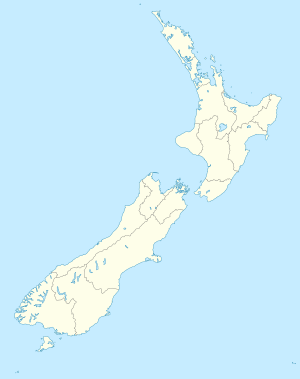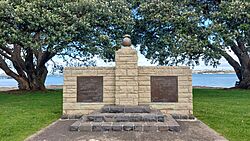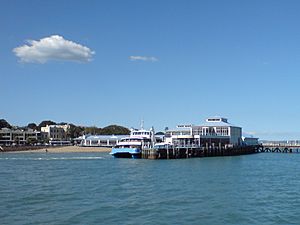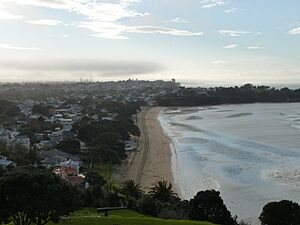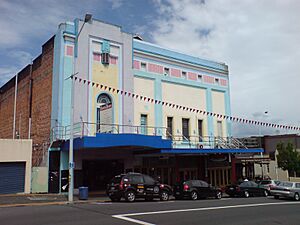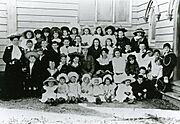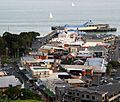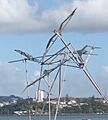Devonport, New Zealand facts for kids
Quick facts for kids
Devonport
|
|
|---|---|
|
Suburb
|
|
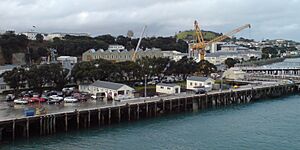
Devonport Naval Base with Mount Victoria visible in background
|
|
| Country | New Zealand |
| Local authority | Auckland |
| Electoral ward | North Shore ward |
| Local board | Devonport-Takapuna Local Board |
| Established | 1841 |
| Area | |
| • Land | 189 ha (467 acre) |
| Population
(June 2023)
|
|
| • Total | 5,100 |
| Postcode(s) |
0624
|
| Ferry terminal(s) | Devonport Wharf |
| Hospitals(s) | Navy Hospital |
|
|
||
Devonport is a cool suburb right by the water in Auckland, New Zealand. It's on the North Shore, at the tip of a peninsula that sticks out into the Waitematā Harbour. To the east, you'll find North Head, a special place that guards the harbour's entrance.
Devonport is home to the Devonport Naval Base, which is the main place for New Zealand's navy ships. But it's also famous for its lovely restaurants and cafes by the harbour, and its old-fashioned charm. Some people even compare it to Sausalito in California, USA, because of its beautiful views and setting.
Contents
What's in a Name?
Devonport got its name from an old naval town in England, also called Devonport.
The eastern part of Devonport is known as Cheltenham. This name also comes from an English town called Cheltenham.
Devonport's Unique Landscape
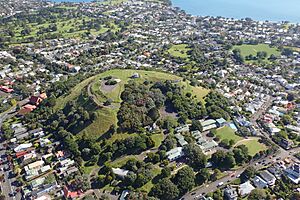
Devonport is a peninsula located at the mouth of the Waitematā Harbour on Auckland's North Shore. It's surrounded by water on three sides: Ngataringa Bay to the northwest, the Waitematā Harbour to the south, and the Rangitoto Channel to the east.
To the west of Devonport, you'll find the suburb of Stanley Point. To the north are Narrow Neck and Vauxhall. There's also a smaller peninsula called Duders Point within Ngataringa Bay.
Devonport has three beaches where you can relax and play: Devonport Beach and Duders Beach to the south, and Cheltenham Beach to the northeast.
Ancient Volcanoes Shape the Land
Devonport is special because it has three volcanoes from the Auckland volcanic field: Takarunga / Mount Victoria, Maungauika / North Head, and Takararo / Mount Cambria.
- Maungauika / North Head is the oldest, erupting about 87,500 years ago.
- Takararo / Mount Cambria erupted around 42,300 years ago.
- Takarunga / Mount Victoria erupted about 34,800 years ago.
Takarunga / Mount Victoria is the tallest, reaching 81 meters high. Maungauika / North Head is 65 meters high. Takararo / Mount Cambria used to be 30 meters tall, but much of it was removed in the 1870s. Another small hill, Duders Hill, was also quarried in the early 1900s.
Devonport's Past
Thousands of years ago, Devonport was actually three separate volcanic islands.
The first Māori arrived here around the mid-1300s. This is around the time the Tainui migration canoe is believed to have landed, which is remembered by a stone monument on the shore. A large Māori settlement on North Head was affected by conflicts in the 1790s. Some Māori families lived in Torpedo Bay until 1863, when they moved to the Waikato region during a time of conflict.
A French explorer, Jules Dumont d'Urville, might have been the first European to visit in 1827. The first European building, a gunpowder storage house, was built in 1840.
Devonport is one of Auckland's oldest European settlements, and the very first on the North Shore. In 1841, a signal station was built on Mount Victoria to guide ships into Auckland. The signal master, Robert Snow, and his family were the first Europeans to live there permanently. For a while, the area was called Flagstaff because of this signal station.
For many years, Devonport felt quite separate from the rest of the North Shore. People sometimes called it "the island." A narrow strip of land connected it to Belmont. Later, a swampy area was filled in to create a racecourse (now a golf course), and a new road made travel easier.
The Devonport Naval Base was set up in 1841 because the deep water here was perfect for Royal Navy ships. William Hobson, who was the Governor of New Zealand at the time, thought it was a better spot than other parts of the harbour. Even today, it's the main base for the Royal New Zealand Navy. The Calliope Dock, part of the base, opened in 1888 and was once the biggest dock in the Southern Hemisphere. Devonport also had one of New Zealand's oldest shipyards, which is now part of the Devonport Yacht Club.
The main town centre slowly moved west towards the ferry wharf. By 1859, the settlement was officially named Devonport. It became a Borough (a type of local government area) in 1886 and joined North Shore City in 1989.
Devonport also played a part in New Zealand's nuclear-free movement. In 1981, the Devonport Borough Council was the first local council in New Zealand to declare itself a nuclear-free zone.
In 2007, Devonport was allowed to be an exception to plans for more intense building development. This was because people wanted to protect the special character and history of the Devonport Wharf area.
Ferry Journeys
Ferry services to Auckland city started in the 1840s. At first, small sailing boats took passengers. In 1860, paddle steamers began, and later, in 1904, modern screw-driven ferries took over. Both passenger and car ferries ran until the Auckland Harbour Bridge opened in 1959.
After the bridge opened, most ferry services stopped, except for the Devonport passenger ferry, which ran less often. Many old ferries were scrapped. The last of the old double-ended ferries, the Kestrel (built in 1905), stopped its regular trips in 1988. It was later used for cruises.
In 2002, the Kestrel moved to Tauranga to become a floating restaurant. It returned to Auckland in 2010. Sadly, in 2016, the Kestrel broke apart and sank while docked. Its future is still uncertain.
Devonport's Special Vibe
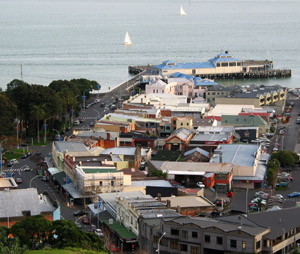
Devonport has many beautiful old villas, some built way back in the 1800s.
The navy base is a big part of Devonport's identity. The local council and the Navy work together to keep their partnership strong. You can also visit the Torpedo Bay Navy Museum in Devonport to learn about naval history.
People and Community
Devonport is home to about 5,079 people. The median age is 49.3 years. Most people (92.3%) are of European background. About 6.4% are Māori, and smaller groups are from Pasifika, Asian, and other backgrounds.
English is spoken by most people, and about 1.2% speak the Māori language. Many people in Devonport have university degrees. The median income here is higher than the national average.
Cool Places to See
Between the wharf and Mount Victoria, you'll find Devonport's shops and several famous spots:
- The Esplanade Hotel – This is a beautiful old hotel from the 1890s, like something you'd see at an English seaside resort.
- Windsor Reserve – A lovely open lawn area next to the Devonport Wharf. It has a unique underground toilet block and an old archway.
- King Edward Parade Reserve – Across the road from Windsor Reserve. Here you'll find the Public Library, a War Memorial statue, and a 1950s bandstand under big fig trees.
- The former Post Office – An Art Deco building from the 1930s.
- The Left Bank – A grand 1920s building that is now a cafe, bar, and restaurant.
- The Victoria Theatre – Built in 1912, this is believed to be the oldest cinema in the Southern Hemisphere that's still in use! It was updated in the 1930s with the popular Art Deco style.
- Devonport Museum – Opened in 1977, this museum tells the story of local history.
- Torpedo Bay Navy Museum – This museum about military and maritime history opened in 2010.
In the Cheltenham area, you can find:
- Cheltenham Beach – A popular sandy public beach.
- Goldwater house – A historic family home from 1907.
- Morrison house – A two-story Italian-style villa from 1896.
- Watson houses – Two villas built in 1899 and 1901.
Devonport Wharf Today
Today, ferry services to Devonport Wharf are more frequent. A trip between Auckland CBD and Devonport takes about 12 minutes, usually on a modern ferry called the 'Seabus Kea'.
The Devonport Wharf and Ferry Terminal have had many repairs and upgrades over the years, including a big $24 million project in 2015. This project improved the car park and modernized the building.
Victoria Wharf
The Victoria Wharf, built in 1929, has also been repaired. It is now home to a cool sculpture called "Flight Support for Albatross" by Greer Twiss.
Local Radio
| Broadcast area | Devonport, Auckland, New Zealand |
|---|---|
| Ownership | |
| Owner | North Harbour Community Radio Trust |
| History | |
|
First air date
|
May 1999 |
| Links | |
| Website | theflea.co.nz |
The Flea 88.2 FM & 107.1FM is a community radio station that broadcasts in Devonport, Auckland. It started in May 1999.
Schools in Devonport
- Devonport Primary School is for students in years 1-6. It opened in 1870 and is located on the side of Mount Victoria.
- St Leo's School is a Catholic primary school for years 1-6. It was founded in 1893.
Both schools are for both boys and girls.
Places of Worship
Devonport has several churches:
- St Francis de Sales and All Souls Roman Catholic church
- Holy Trinity Anglican church
- Connect Interdenominational church
- Devonport Methodist church
- Naval Memorial Chapel of St Christopher's
Sports Clubs
North Shore United AFC
North Shore United is a football (soccer) club that plays at Allen Hill Stadium. Founded in 1887, it's the oldest football club in both New Zealand and Oceania! They have won the Chatham Cup 6 times and the New Zealand Club Championship twice.
North Shore RFC
North Shore Rugby Football Club is a Rugby Union club in Devonport. They play their games at Devonport Domain. Founded in 1873, it is one of the oldest rugby clubs in New Zealand.
Famous People From Devonport
Many notable people have connections to Devonport:
- Finn Andrews & Sophia Burn – members of the band The Veils.
- Tom Ashley – a sailor and windsurfer who won a Gold Medal at the 2008 Beijing Olympics.
- Sir Peter Blake – a famous international yachtsman.
- Angela Cullen – a well-known physiotherapist.
- A. R. D. Fairburn – a poet and critic.
- Tim Finn – a musician and singer.
- Debbie Harwood – a musician and singer from the band When the Cat's Away.
- Lorde – a world-famous pop artist.
- Eliza McCartney – a New Zealand pole vault champion and Olympic Bronze medalist.
- Isabel Peacocke – a teacher, novelist, and broadcaster.
- Sir Dove-Myer Robinson – a former Mayor of Auckland.
- Mary Taylor – an artist.
- Gin Wigmore – a singer-songwriter.
Images for kids
 | May Edward Chinn |
 | Rebecca Cole |
 | Alexa Canady |
 | Dorothy Lavinia Brown |


